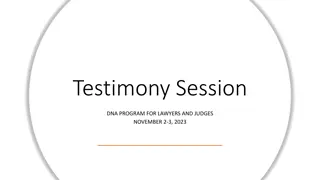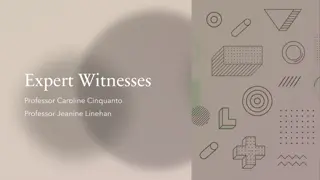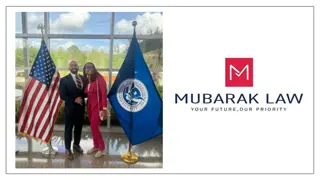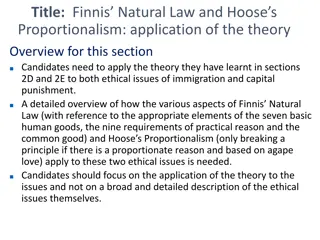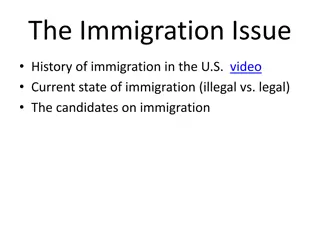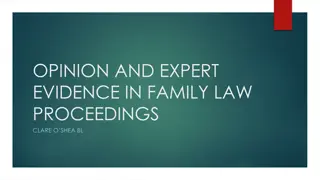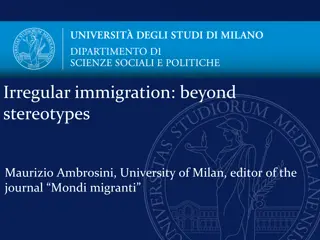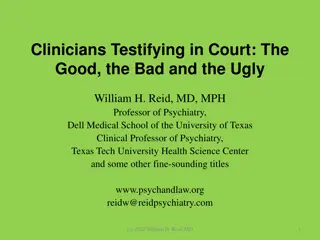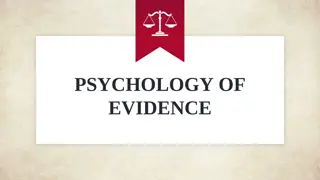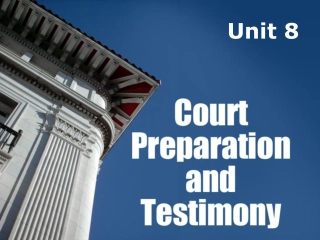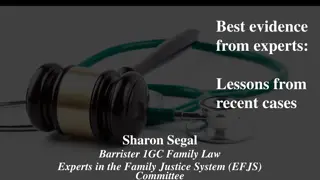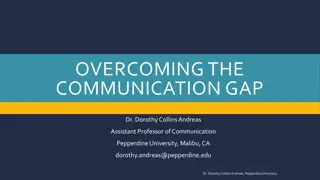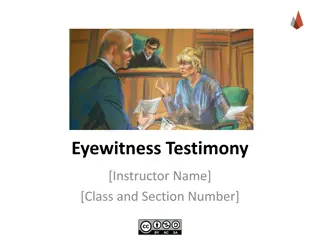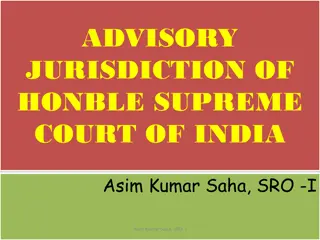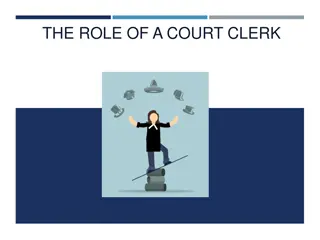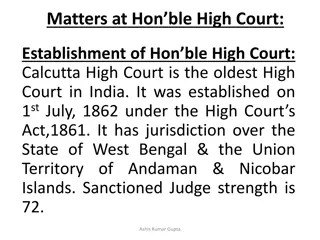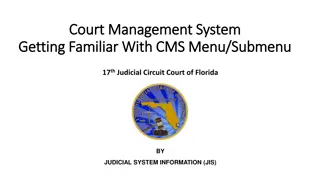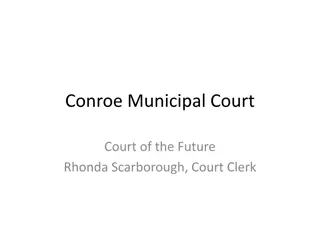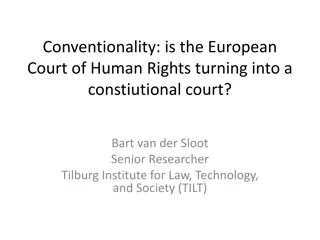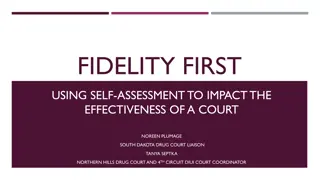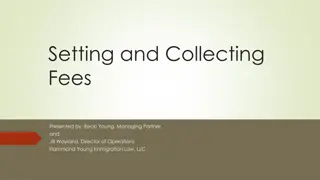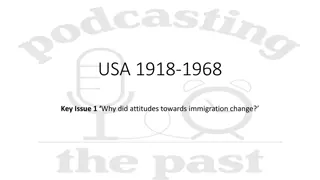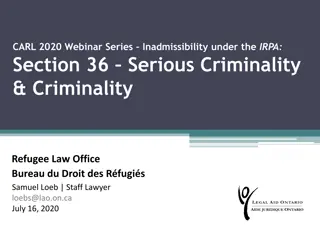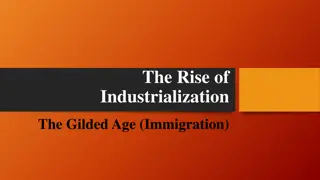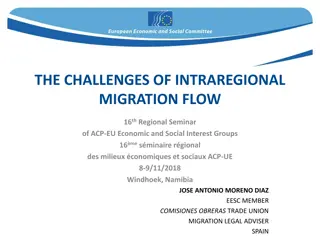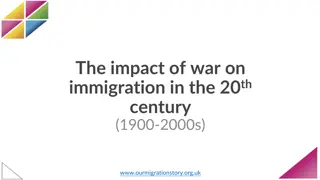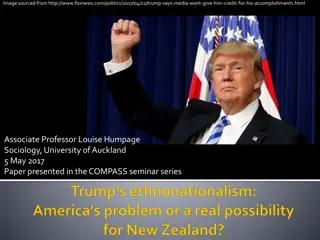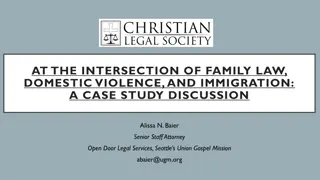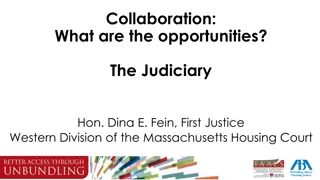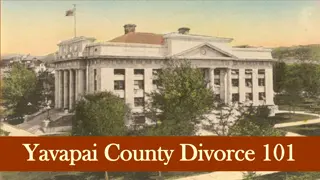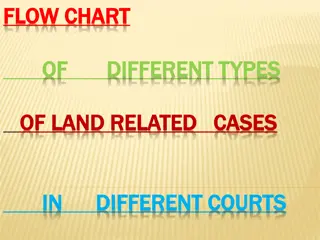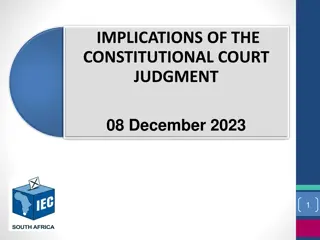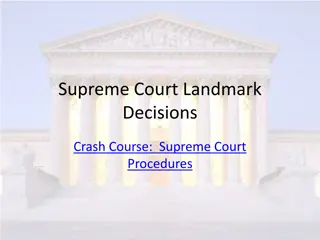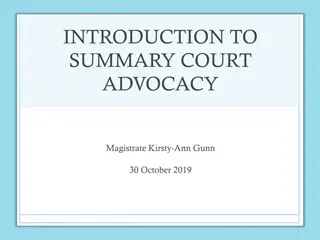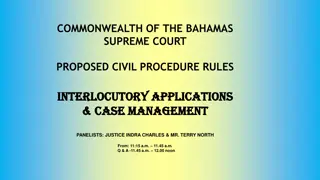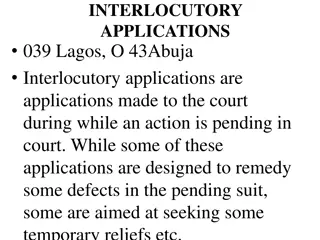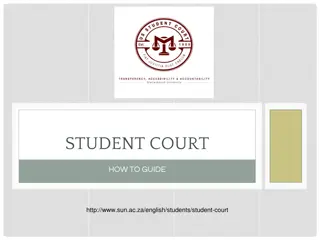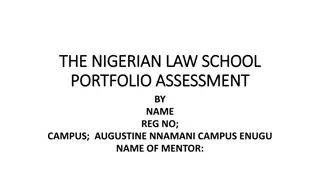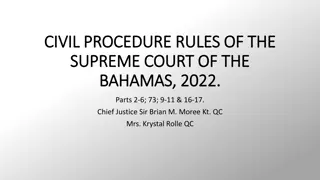Expert Testimony in Immigration Court by Hon. Dorothy Harbeck
Explore the essence of expert testimony in immigration court through the lens of Hon. Dorothy Harbeck, the Eastern Region Vice President of NAIJ. Delve into the administrative structure of immigration law and the role of the Department of Justice - EOIR - OCIJ in the trial court for removal. Gain insights into the complex landscape of immigration law and the initiatives advocating for judicial independence. Access valuable educational material while navigating the intricacies of immigration proceedings.
Download Presentation

Please find below an Image/Link to download the presentation.
The content on the website is provided AS IS for your information and personal use only. It may not be sold, licensed, or shared on other websites without obtaining consent from the author. Download presentation by click this link. If you encounter any issues during the download, it is possible that the publisher has removed the file from their server.
E N D
Presentation Transcript
1 THE GOLDEN THREAD OF EXPERT TESTIMONY IN IMMIGRATION COURT HON. DOROTHY HARBECK, EASTERN REGION VICE PRESIDENT NAIJ
2 Thanks to Mortimer, John Clifford, CBE, QC Rumpole and the Golden Thread (1982) and Woolmington v. Director of Public Prosecutions, [1935] A.C., 462 for the title.
3 The presenter is the Eastern Region Vice President of the National Association of Immigration Judges (NAIJ). The views expressed here do not necessarily represent the official position of the United States Department of Justice, the Attorney General, or the Executive Office for Immigration Review. The views represent the author s personal opinions, which were formed after extensive consultation with the membership of the NAIJ.
4 Presentation to the International Migration (IM) Section of the American Sociological Association (ASA)
5 This material is for educational purposes only and should not be construed as legal advice.
ADMINISTRATIVE STRUCTURE 6 Immigration law stems from the Immigration and Nationality Act (INA) as amended over the years since its initial enactment in 1952. Several federal administrative agencies implement the nation s immigration laws. See, generally, McCarran-Walter Act, Pub. L. No. 82-414, 66 Stat. 163 (1952) (as amended) and Scaperlanda Michael A., Immigration Law: A Primer (Federal Judicial Center, 2009).
DEPARTMENT OF JUSTICE-EOIR-OCIJ (TRIAL COURT FOR REMOVAL) 7 EOIR is actually three units within the DOJ. The Office of the Chief Immigration Judge (OCIJ) overseas the immigration courts where IJs conduct formal removal hearings, adjudicating whether to deny entry, remove/deport, or grant relief to aliens facing removal. In 2002, the NAIJ began an effort to have immigration judges reclassified as Article I judges, giving them independence from the DOJ. In 2017, this effort was endorsed by the ABA, the FBA and AILA
EOIR WEBSITE 8 The U.S. Department of Justice- Executive Office for Immigration Review (USDOJ-EOIR) has a website at: http://www.justice.gov/eoir
EOIR WEBSITE 9 Immigration Court Practice Manual is posted here. This is a comprehensive practice guide that sets forth the uniform procedures, recommendations, and requirements for court filings and the conduct of proceedings. At this site, you can also access the Virtual Law Library, which contains the text of the Immigration & Nationality Act (INA), the text of volume 8 of the Code of Federal Regulations (CFR), Board of Immigration Appeals (BIA) decisions and the EOIR Immigration Law Advisor. Past issues of the Immigration Law Advisor have comprehensive articles on many evidentiary matters.
IMMIGRATION COURT RULINGS 10 The decisions of IJs are final unless timely appealed or certified to the Board of Immigration Appeals (BIA). However, some decisions can be reopened or reconsidered. The decisions of the BIA can be appealed to the U.S. Circuit Courts of Appeals.
ENFORCEMENT ENTITIES -- HOMELAND SECURITY 11 The two enforcement entities, both located within DHS, are the U.S. Customs and Border Protection (CBP) and the U.S. Immigration and Customs Enforcement (ICE). CBP provides border enforcement, including enforcement at interior points of entry. ICE is responsible for interior investigation and enforcement. See generally http://www.cbp.gov/ and http://www.ice.gov/index.htm
EVIDENTIARY STANDARD 12 In immigration proceedings, the sole test for admission of evidence is whether the evidence is probative and its admission is fundamentally fair. See Espinoza v. INS, 45 F.3d 308, 310 (9th Cir. 1995); Nyama v. Ashcroft, 357 F.3d 812, 816 (8th Cir. 2004); Matter of DeVera, 16 I&N Dec. 266, 268-69 (BIA 1977).
EVIDENTIARY STANDARD 13 The Federal Rules of Evidence are not binding in immigration proceedings, and IJs have broad discretion to admit and consider relevant and probative evidence. See Matter of Interiano-Rosa, 25 I&N Dec. 264, 265 (BIA 2010); Matter of DeVera, 16 I&N Dec. at 268; See also Section 240(b)(1) of the Act, 8 U.S.C. 1229a(b)(1) (2006); Navarrette-Navarrette v. Landon, 223 F.2d 234, 237 (9th Cir. 1955)
ADMISSIBILITY OF EVIDENCE IN IMMIGRATION COURT 14 The Federal Rules of Evidence do not apply in immigration proceedings. Nevertheless, they may provide helpful guidance because the fact that specific evidence would be admissible under the Federal Rules lends strong support to the conclusion that admission of the evidence comports with due process. Matter of D-R-, 25 I&N Dec. at 458 n.9 (quoting Felzcerek v. INS, 75 F.3d 112, 116 (2d Cir. 1996)). IJs possess broad discretion during hearings, and a due process violation occurs only when the proceeding was so fundamentally unfair that the alien was prevented from reasonably presenting his case. Lin v. Holder, 565 F.3d 971(2d Cir. 2009)
OPINION V. FACT 15 An IJ incorrectly suggested that a fact witness in an immigration case needed to be qualified as an expert witness in order to testify. The fact witness tried to testify about his personal experiences and the trauma he had suffered, and was denied the opportunity to do so by the IJ. On appeal, the BIA held that the requirements regarding the admission of expert and lay opinion testimony were inapposite to the witness testimony, which, in any case, was in compliance with the Federal Rules. See also, e.g., United States v. Champion, 813 F.2d 1154, 1172 (11th Cir. 1987) (finding that a witness testimony regarding the events at issue was based on her personal knowledge and was therefore not opinion testimony). See Matter of Y-S-L-C-, 26 I&N Dec. 688 (BIA 2015)
EXPERT WITNESS DEFINTION 16 An expert witness is broadly defined as one who is qualified as an expert by knowledge, skill, experience, training or education and who has specialized knowledge that will assist the IJ to understand the evidence or determine a fact at issue. Matter of D-R-, 25 I&N Dec. 445 (BIA 2011).
THE PURPOSE OF AN EXPERT WITNESS 17 The purpose of an expert in immigration court is to assist the trier of fact to understand things outside the trier of fact s knowledge. An expert has scientific, technical, or other specialized knowledge [that] will assist the trier of fact to understand the evidence or to determine a fact in issue. Fed. R. Evid. 702; see also Matter of Marcal Neto, 25 I&N Dec. 169, 176 (BIA 2010) (stating that Immigration Judges may rely on experts regarding matters on which they possess little or no knowledge or substantive expertise ).
THE SPIRIT OF DAUBERT IS APPLICABLE IN IMMIGRATION COURT 18 See Pasha v. Gonzales, 433 F.3d 530 (7th Cir. 2005) the Seventh Circuit employed the expert standard from Daubert v. Merrill Pharmaceuticals, 509 U.S. 579 (1993) in an immigration case. The IJ has the discretion to exclude expert testimony; BUT junk science expert reports have no place in immigration court. See also, Matter of V-K-, 24 I&N Dec. 500, fn. 2 (BIA 2008); Akinfolarin v. Gonzales, 423 F.3d 39, 43 (1st Cir. 2005).
THE DAUBERT TEST 19 1. Has the methodology been tested or is it testable? 2. Has the methodology been subjected to peer-review publication? 3. Is there a known or knowable error rate for the methodology? 4. Is the methodology generally accepted in the relevant field? The test is flexible not all four Daubert factors will apply to every expert in every case.
SPIRIT OF DAUBERT IN PRACTICE 20 Experts opinions should be based on reliable sources reasonably relied upon by experts in the particular field There should be a link between the facts or data the expert has worked with and the conclusion the expert s testimony is intended to support See generally, United States v Mamah, 332 F.3d 475, 478 (7th Cir. 2003); Fed.R.Evid.703.
WEIGHT OF EXPERT TESTIMONY 21 If an IJ permits an expert witness to testify but has concerns about the witness reliability, the judge may accord less weight to the testimony. An IJ can accord a testimony more or less weight based on the witness publication experience, education and work experience in the relevant field, and potential bias. Malphrus, Garry. 2010. Expert Witnesses in Immigration Proceedings. Immigration Law Advisor, U.S. DOJ Executive Office for Immigration Review, 4(5): 1-14.
C.V. DOCUMENT 22 Expert witnesses should present their qualifications: publication, education, and work experience that is relevant to the case. Often, the parties stipulate as to the credentials of the expert-- however, voir dire questioning is at the discretion of the IJ. Expert witnesses should present their summary of findings and opinions-- their opinion of the applicant s situation based on their expertise (including reliable sources in their field)
AFFIDAVIT OF AN EXPERT 23 An expert affidavit: should not be overly conclusory in the opinion it offers. should contain facts and rationale for the opinion. should be prepared specifically for the applicant s situation, and should be particular to the applicant s circumstances.
EXPERT WITNESS OPINION 24 An expert can base his/her opinion on hearsay and need not have personal knowledge of the facts underlying his opinion. An opinion may include reasonable inferences that the expert draws from the available facts and data. The facts or data need not be admissible in evidence, and an expert may assume the truth of the facts or data in order to render an opinion. See, generally, Aguilar-Ramos v. Holder, 594 F.3d 701, 706 n.7 (9th Cir. 2010).
EXPERT WITNESS OPINION 25 Witnesses generally may NOT present opinions on questions of law. Malphrus, Garry. 2010. Expert Witnesses in Immigration Proceedings. Immigration Law Advisor, U.S. DOJ Executive Office for Immigration Review, 4(5): 1-14.
EXPERT WITNESS SHOULD BE AVAILABLE FOR CROSS EXAMNINATION 26 While the affidavit of an expert is generally admissible without the expert being made available to testify, the statement may be given less weight because the author is not produced for cross-examination. Malphrus, Garry. 2010. Expert Witnesses in Immigration Proceedings. Immigration Law Advisor, U.S. DOJ Executive Office for Immigration Review, 4(5): 1-14. See also, Chen v. Gonzales, 434 F.3d 212, 218 (3d Cir. 2005); De Brown v. Dep t of Justice, 18 F.3d 774, 778 (9th Cir. 1994).


